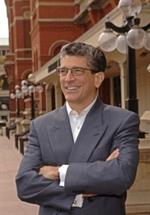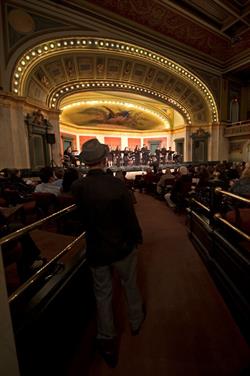Making Waves Blog
How the Arts Make An Impact
Check here for new blog posts, podcasts and more that point to how the arts make an impact on our community.
Opera Fusion: New Works Leads to World Premiere
posted by Cecilia Long & Rebecca Bromels ON
Jun 09, 2015
The development and production of new work is just one of the ways our largest arts organizations build the national and international reputation of our region. This summer, Cincinnati Opera produces the world premiere of Morning Star, a new opera by celebrated composter Ricky Ian Gordon. The piece received two workshops through Opera Fusion: New Works, a unique collaboration between Cincinnati Opera and University of Cincinnati’s College Conservatory of Music created in 2011 to foster the development of new American operas. The program offers composers or composer/librettist teams the opportunity to workshop an opera during a 10-day residency in Cincinnati, utilizing the talent, personnel, and facilities of both organizations. To learn more about Morning Star and Opera Fusion: New Works, we spoke with Evans Mirages, The Harry T. Wilks Artistic Director of Cincinnati Opera.
-
 What first attracted the Cincinnati Opera to Morning Star and how did you decide to host the new work’s world premiere?
What first attracted the Cincinnati Opera to Morning Star and how did you decide to host the new work’s world premiere?
Marcus Küchle and Robin Guarino, the co-artistic directors of our Opera Fusion: New Works program, approached Ricky Ian Gordon to workshop any of his pending commissions. Ricky replied that rather than work on a piece that had a scheduled premiere, he wanted to workshop a piece that had not yet received such attention. This intrigued us, and with no promise to actually produce the resulting work, we invited him to come with Morning Star. By the end of the Opera Fusion: New Works workshop, Patty Beggs and I were convinced Morning Star was an exciting work that deserved a premiere. But, there were still unanswered ‘questions’ both dramatically and musically. And so, we took the unusual step of giving the piece a second workshop, outside the parameters of the Opera Fusion: New Works program.
-
How was the collaboration with CCM through the Opera Fusion: New Works residency program an important step in the making of this opera?
Opera Fusion: New Works is revolutionizing the way Cincinnati Opera engages with composers of today and their operas. It would simply not be possible to provide creative teams with the rich variety of exciting young singers for this workshop process without CCM. As one of the finest conservatories in the nation, with a particularly strong reputation for vocal studies, CCM offers us the artists and its inspired director of opera, Robin Guarino, as artistic partners. Cincinnati Opera provides the space, the professional expertise in production, and the talents of our staff to nurture and move the process forward.
-
What important themes and social issues does the Cincinnati Opera hope to explore by retelling this piece of American history?
 The American Labor Movement was in its infancy in 1911. Workers’ rights and workers’ safety were by no means a given in the workplace. The horrible tragedy of the Triangle Shirtwaist Factory Fire on March 25, 1911, spurred on national efforts across industries to make factories safer. The Triangle Fire looms over the entire opera, in that one of the Felderman daughters will die in that conflagration and the emotional ‘embers’ of that fire will drive one of the remaining daughters to become a ruthless businesswoman who tries to defy the inevitable forward motion of organized labor. In addition, the opera highlights the immigrant experience of the huge influx of Southern and Eastern Europeans to America between 1880 and 1920. Though the Feldermans are a fictional family, their emigrant story of fleeing the anti-Jewish pogroms of the dying Russian Imperial era is the story of millions of men, women, and children, hoping to find freedom and prosperity in the ‘Goldene Medina’ – The Land of Opportunity.
The American Labor Movement was in its infancy in 1911. Workers’ rights and workers’ safety were by no means a given in the workplace. The horrible tragedy of the Triangle Shirtwaist Factory Fire on March 25, 1911, spurred on national efforts across industries to make factories safer. The Triangle Fire looms over the entire opera, in that one of the Felderman daughters will die in that conflagration and the emotional ‘embers’ of that fire will drive one of the remaining daughters to become a ruthless businesswoman who tries to defy the inevitable forward motion of organized labor. In addition, the opera highlights the immigrant experience of the huge influx of Southern and Eastern Europeans to America between 1880 and 1920. Though the Feldermans are a fictional family, their emigrant story of fleeing the anti-Jewish pogroms of the dying Russian Imperial era is the story of millions of men, women, and children, hoping to find freedom and prosperity in the ‘Goldene Medina’ – The Land of Opportunity.
-
What do you hope patrons of the opera will take away after attending a production of Morning Star?
As I do with any opera-going experience, I hope the patron will be ‘changed’ at the end of the evening from when he or she entered the theater. This can be as simple an emotional response of gladness to have experienced live art. It can also be richer, especially with Morning Star. To paraphrase Santayana: “those of us who are not aware of history are doomed to repeat it.” I have been surprised at just how many men and women both mature and young have NO knowledge of the beginnings of the American Labor Movement and absolutely no knowledge of the Triangle tragedy. I firmly believe opera can serve as a catalyst for conversation and a change in attitude. We have all the tools at our disposal to do so: Music, to beguile you and provide the emotional undertone of the story. The story itself, told vividly in beautifully crafted lyric prose, the singing actors and actresses to bring it to life, and a production whose visual and overall theatrical values hold the audience’s attention. I hope our audiences will come away from Morning Star with two impressions: one, that their ancestors devoted blood, sweat, tears, and sometimes their lives so that succeeding generations would have the right to work in a safe environment and at a decent wage. And two, that ‘the family abides,’ as the matriarch Becky Felderman says more than once in the opera. Through all their trials and tribulations, the love that the Feldermans have for one another sees them through sorrow and joy.
For a behind-the-scenes look into the process of bringing Morning Star to the stage, you can see a sneak peek of the new documentary short film Making Morning Star this Thursday, July 11 at the Kenwood Theatre. Call the Cincinnati Opera Box Office at (513) 241-2742 to reserve tickets. Morning Star has its world premiere on June 30 at the School for Creative and Performing Arts with performances continuing through July 19.
Photos by Philip Groshong. Photos from top to bottom:
Evans Mirageas, The Harry T. Wilks Artistic Director of Cincinnati Opera
Composer Ricky Ian Gordon watches the workshop performance at Memorial Hall in December 2012.
Composer Ricky Ian Gordon works with CCM student Tyler Alessi during the 2012 workshop.